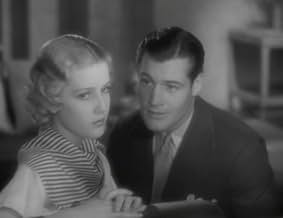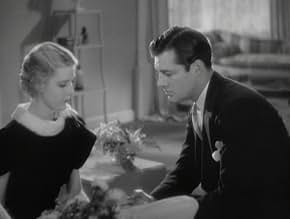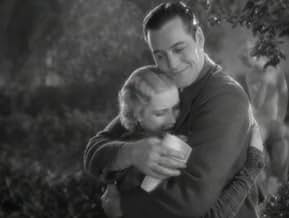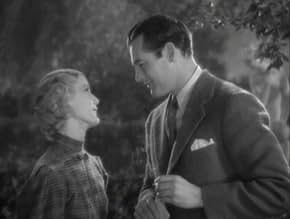An American heiress marries a lord, and shocks London society.An American heiress marries a lord, and shocks London society.An American heiress marries a lord, and shocks London society.
- Director
- Writers
- Stars
- Awards
- 1 win total
Violet Kemble Cooper
- Duchess
- (as Violet Kemble-Cooper)
Virginia Howell
- Mrs. Saunders
- (scenes deleted)
Walter Walker
- Mr. Saunders
- (scenes deleted)
Finis Barton
- Diana - George's Mistress
- (uncredited)
Bunny Beatty
- Lady Helen
- (uncredited)
May Beatty
- Duchess of Hightower
- (uncredited)
Tyrell Davis
- Ernest
- (uncredited)
Bradley Metcalfe
- Little Boy
- (uncredited)
- Director
- Writers
- All cast & crew
- Production, box office & more at IMDbPro
Featured reviews
Constance Bennett is a disillusioned socialite in "Our Betters," based on Somerset Maugham's play. Bennett plays a beautiful woman (in absolutely knockout gowns) who, on her wedding day, discovers that her husband has a mistress, a Charles-Diana-Camilla thing. Bennett's got the cash, and the girlfriend's poor. Constance, who plays Lady Pearl, throws herself into the London social scene, where nobody behaves. Her husband is always off with his girlfriend, and she has a lover who keeps her since her husband went through her money. And everyone else behaves the same way. The only thing that matters is knowing the right people, having money, getting invited to the right parties, and marrying titles. When Pearl's sister arrives from America, she's dazzled by the life and brushes off an old beau, played by Charles Starrett, who is the moral voice of the movie.
This was the world of Elliot Templeton in "The Razor's Edge" and it's visited here fully with a brittle humor but not a great deal of energy. Bennett is perfect in her role. There are some scenes between Violet Kemble, who plays Minnie, and her much younger gigolo boyfriend, Gilbert Roland, where he manipulates her, that are overly long but quite funny. The final scene, with the dancing Ernest, is the best in the film.
This was the world of Elliot Templeton in "The Razor's Edge" and it's visited here fully with a brittle humor but not a great deal of energy. Bennett is perfect in her role. There are some scenes between Violet Kemble, who plays Minnie, and her much younger gigolo boyfriend, Gilbert Roland, where he manipulates her, that are overly long but quite funny. The final scene, with the dancing Ernest, is the best in the film.
Constance Bennett plays Pearl, an heiress bride who, on her wedding day immediately after the ceremony, overhears her new husband tell his lover that he married Pearl only for her money as he and his lover are penniless. However, he does have a British title, and Constance goes to live in Britain with him, with their lavish lifestyle at first financed by her money. When that runs out, she has a lover who supplies her with cash.
I generally watch these old films to escape the cynicism of today's world, and this film fails in that respect. The entire cast behaves in a despicable and inhuman manner like something out of ancient Rome, with the exception of Pearl's young sister Bessie, who is a wide-eyed innocent about to make the same mistake as Pearl did when she married her faithless husband. We all figure that Pearl behaving like a manipulative pleasure-addicted ice queen is rooted in her husband's betrayal, but nothing is said about motivation at all until the end of the film. George Cukor generally did a great job in these "women's films", especially if Katharine Hepburn was starring. But then Kate was such an excellent actress that she could get her motivation across without the use of explicit dialogue. Constance Bennett usually could do so too, so why things don't pan out here theatrically I have no idea.
As an aside, it is interesting that Gilbert Roland and Constance Bennett play lovers in this and one other film from 1933 - "After Tonight" - yet don't marry until eight years later. I wonder if there's a story there?
I generally watch these old films to escape the cynicism of today's world, and this film fails in that respect. The entire cast behaves in a despicable and inhuman manner like something out of ancient Rome, with the exception of Pearl's young sister Bessie, who is a wide-eyed innocent about to make the same mistake as Pearl did when she married her faithless husband. We all figure that Pearl behaving like a manipulative pleasure-addicted ice queen is rooted in her husband's betrayal, but nothing is said about motivation at all until the end of the film. George Cukor generally did a great job in these "women's films", especially if Katharine Hepburn was starring. But then Kate was such an excellent actress that she could get her motivation across without the use of explicit dialogue. Constance Bennett usually could do so too, so why things don't pan out here theatrically I have no idea.
As an aside, it is interesting that Gilbert Roland and Constance Bennett play lovers in this and one other film from 1933 - "After Tonight" - yet don't marry until eight years later. I wonder if there's a story there?
American hardware heiress Constance Bennett marries English lord Alan Mowbray. Then she overhears him remarking to his mistress he only married her for her money. She's heartbroken, but becomes a pillar of British society. When her sister, Anita Louise, comes to visit, Miss Bennett engineers a breakup with Miss Louise's American fiance, and an engagement to a British nobleman.
This definitely pre-code movie is based on a W. Somerset Maugham play, with lots of snide business and the sort of arch comments that passed for wit in a post-Oscar Wilde theater. Director George Cukor has mediocre success in convincing his cast that this is no longer being performed on the boards. The result is that the Americans are rather quiet, while the British are over the top... which may have been a deliberate choice, given that at this time, British movies seemed to have a lot of appearances by Finlay Currie as an American (invariably named 'Hiram' or some such), flattening his vowels with a sledge hammer and being obnoxious about money. Minor Watson is outstanding as an admirer of Miss Bennett, and Tyrell Davis is flamboyant as he teaches Violet Kemble Cooper to dance.
This definitely pre-code movie is based on a W. Somerset Maugham play, with lots of snide business and the sort of arch comments that passed for wit in a post-Oscar Wilde theater. Director George Cukor has mediocre success in convincing his cast that this is no longer being performed on the boards. The result is that the Americans are rather quiet, while the British are over the top... which may have been a deliberate choice, given that at this time, British movies seemed to have a lot of appearances by Finlay Currie as an American (invariably named 'Hiram' or some such), flattening his vowels with a sledge hammer and being obnoxious about money. Minor Watson is outstanding as an admirer of Miss Bennett, and Tyrell Davis is flamboyant as he teaches Violet Kemble Cooper to dance.
This is a delightfully bitter and witty play by Maugham, adapted to film almost exactly as it appeared on stage. Kemble as Minnie steals the show. And the last scene, between Minnie and the dance instructor, is simply hilarious. Charles Starrett, later a Western star in "B" movies, is wooden, and poor Gilbert Roland doesn't have a lot to work with in the script. But the others sparkle and shine, telling us what sophisticated light comedy can be at its best. What a shame this has not appeared on VHS.
W Somerset Maughan, the influential English writer and playwright, was a man that knew a lot about the upper crust society of England. His delightful play about rich people living privileged lives, serves as the basis of this movie that is not seen often. The film is greatly helped by the direction given by George Cukor, a man who was in his element eliciting excellent performances of his cast.
Best of all is Constance Bennett, a luminous presence in the movies of those days that was at the height of her popularity when "Our Betters" was made. Ms. Bennett had a beautiful figure and she could act. In the film she plays Lady Pearl Grayston, an American living in London.
The other extraordinary performance is given by Violet Kemble, who as Minnie, the Duchess of Surae, shows quite a range as the silly old woman in love with a young playboy. Ms. Kemble is enormously funny at one point, then, when she discovers her Pepi's infidelity, she is quite crossed with her hostess for taking such a step right in front of her.
The others in the cast are quite good. Phoebe Foster, the gorgeous Anita Louise, Gilbert Roland, Alan Mowbray, and in an over the top performance in the last sequence by Tyrell Davis who, as a flighty Ernest, shows up made up and with all the best intentions to make the Duchess learn how to dance the tango.
A delightful comedy thanks to Mr. Maughan and Mr. Cukor.
Best of all is Constance Bennett, a luminous presence in the movies of those days that was at the height of her popularity when "Our Betters" was made. Ms. Bennett had a beautiful figure and she could act. In the film she plays Lady Pearl Grayston, an American living in London.
The other extraordinary performance is given by Violet Kemble, who as Minnie, the Duchess of Surae, shows quite a range as the silly old woman in love with a young playboy. Ms. Kemble is enormously funny at one point, then, when she discovers her Pepi's infidelity, she is quite crossed with her hostess for taking such a step right in front of her.
The others in the cast are quite good. Phoebe Foster, the gorgeous Anita Louise, Gilbert Roland, Alan Mowbray, and in an over the top performance in the last sequence by Tyrell Davis who, as a flighty Ernest, shows up made up and with all the best intentions to make the Duchess learn how to dance the tango.
A delightful comedy thanks to Mr. Maughan and Mr. Cukor.
Did you know
- TriviaElsa Maxwell was brought in as technical advisor for this film because of her vast experience in hosting events for royalty and high society. She also assisted Hattie Carnegie in the designs for the evening gowns worn by the principle actresses.
- GoofsAlthough Bessie is supposed to be from New York, Anita Louise plays her with an affected British accent.
A person's accent is not "cast in concrete". Accents change due to a change in environment or because a person is trying to blend in (or even acting). Regardless, a questionable accent certainly wouldn't be considered a "Plot hole".
- Quotes
[last lines]
Minnie, Duchess of Sourae: You know, you're very naughty sometimes, Pearl, but you have a good heart and I can't help being fond of you.
Lady Pearl Saunders Grayston: Minnie!
Minnie, Duchess of Sourae: Pearl!
[they embrace]
Ernest: Ah! What an exquisite spectacle! Two ladies of title, kissing one another!
- ConnectionsFeatured in Celluloid Closet (1995)
- SoundtracksThe Wedding March
(1843) (uncredited)
from "A Midsummer Night's Dream, Op.61"
Written by Felix Mendelssohn
Played by an offscreen organ during the wedding
Details
- Runtime
- 1h 23m(83 min)
- Color
- Aspect ratio
- 1.37 : 1
Contribute to this page
Suggest an edit or add missing content



































